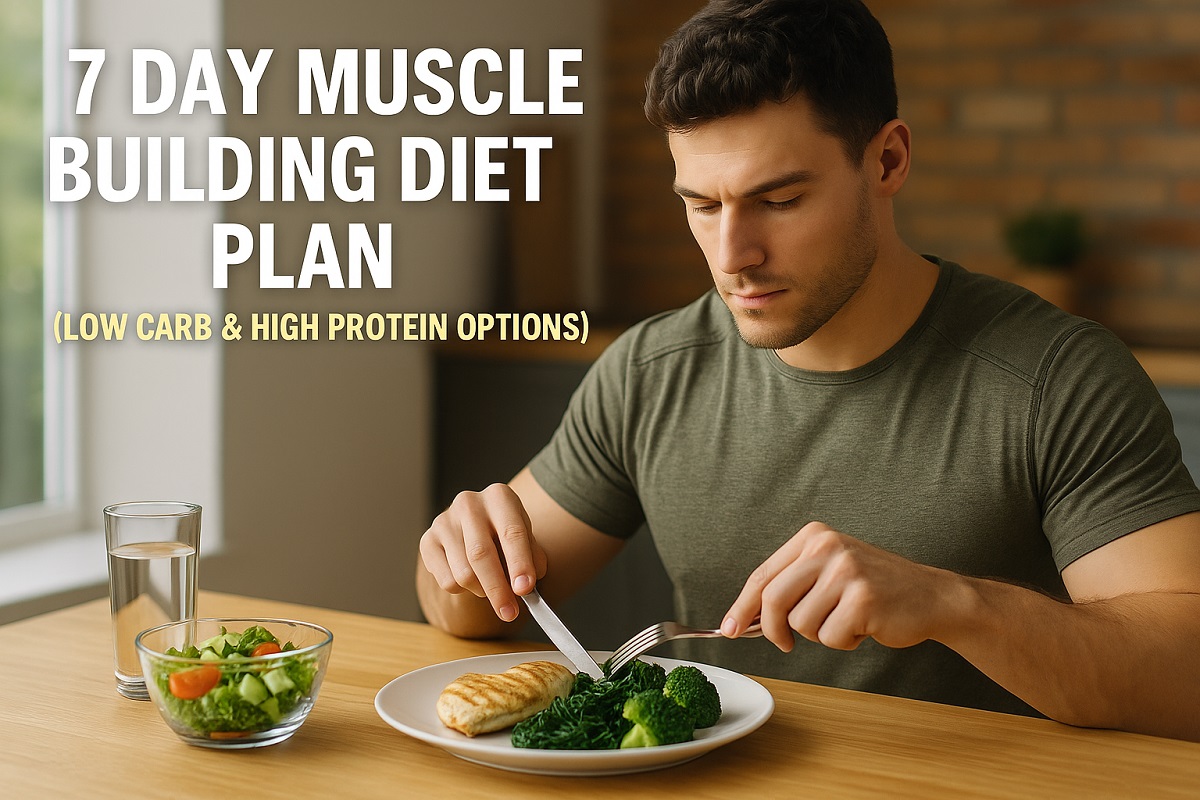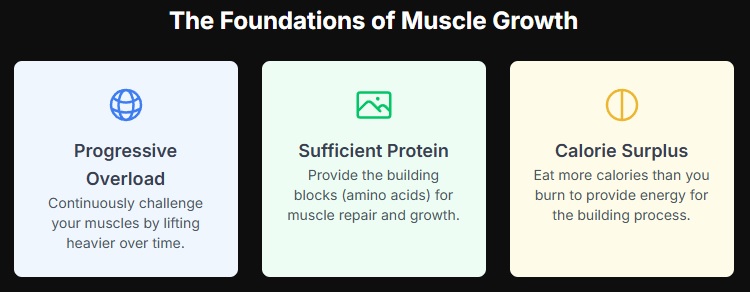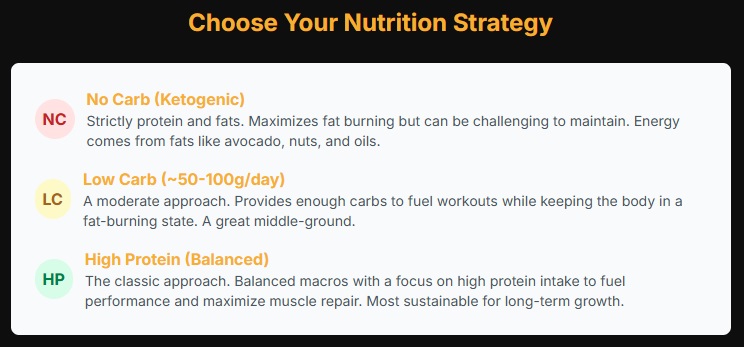7 Day Muscle Building Diet Plan (Low Carb & High Protein Options)

Ask any seasoned bodybuilder, and they’ll tell you nutrition is half the battle. You can crush the weights day after day, but if your diet isn’t aligned with your muscle-building goals, progress stalls. The biggest debate? Carbs vs. low-carb vs. no-carb diets. Some athletes swear by carbs as their fuel for heavy lifts, while others lean on high protein and fat to stay lean and shredded.
So, do you actually need carbs to build muscle? Or can you still grow without them? Let’s cut through the noise, answer the most common questions bodybuilders have about carbs, and finish with a complete 7-day muscle-building diet plan tailored for no-carb, low-carb, and high-protein approaches.

Do you really need carbs to build muscle?
Honestly? No, not strictly. But it's complicated. Muscle growth is triggered by three main things: progressive overload (lifting heavier over time), enough protein to repair and build tissue, and a calorie surplus (eating more than you burn). Carbs don't directly build muscle tissue - that's protein's job.
What carbs *do* is provide glycogen, which is the high-octane fuel your muscles use for intense workouts. Think of it this way: protein provides the bricks to build the house, and carbs are the energetic, fast-moving construction crew. You can still build the house with a different crew - fats, for instance - but the work might feel slower and harder, especially at first. When you go low-carb or no-carb, your strength and endurance can take a nosedive until your body adapts to using fat for fuel. So while they aren't essential building blocks, they are damn good fuel for the work that stimulates growth.
How many carbs do bodybuilders eat?
This completely depends on whether they're trying to get huge (bulking) or shredded (cutting). It's a night-and-day difference.
- Bulking Phase: During a growth phase, it's common for bodybuilders to consume 2 - 5 grams of carbs per pound of body weight. For a 200lb guy, that's a massive 400 - 1000 grams of carbs a day. Yeah, it's a lot of food. This ensures their glycogen stores are always topped off for brutal workouts and recovery.
- Cutting Phase: When it's time to lose fat for a competition, carbs are one of the first things to be strategically cut. This can drop to as low as 50 - 150g per day (a low-carb approach) or even near zero on specific "no-carb days" to maximize fat burning.
What happens when you cut carbs and increase protein?
When you drastically reduce carbs and ramp up your protein intake, a few key things happen. First, if your carbs go low enough (usually under 50g/day), your body enters a state called ketosis. It’s basically a survival mechanism where your body starts producing ketones from fat to use as its main energy source instead of glucose from carbs.
The high protein intake is crucial here. It sends a powerful signal to your body to preserve muscle tissue, even in a calorie deficit. You’re telling it, "Hey, burn this body fat for energy, but leave my muscles alone!" The first week or two can be rough, though. Your workouts might feel like you're lifting through sand until your body gets efficient at using fat for fuel. This transition period is often the hardest part.
Why do bodybuilders do "no-carb days"?
This is an advanced technique, usually part of a "carb cycling" protocol. It’s not something you do randomly. A no-carb day is designed to completely deplete your muscle glycogen stores. Why would you want to do that? It dramatically increases your body's insulin sensitivity.
After a day of no carbs, when you reintroduce them, your muscles are like dry sponges. They are primed to soak up every last gram of glucose to refill glycogen, pulling water and nutrients into the muscle cell along with it. This can make you look fuller and more vascular, and it helps ensure the carbs you eat are used for recovery, not fat storage. It's a strategic tool for breaking through a fitness plateau and accelerating fat loss.
Why do some bodybuilders avoid carbs?
For physique athletes, it's often about aesthetics and control. First, carbs make your body retain water. For every gram of glycogen stored in your muscles, your body stores about 3 grams of water with it. Cutting carbs helps shed that water, leading to a tighter, drier, and more "shredded" look on stage. Second, it's about managing insulin, the hormone that shuttles nutrients into cells. Constantly spiking insulin with high-carb meals can make it harder to burn fat. By keeping carbs low, they keep insulin levels stable, which can promote a fat-burning state.
Is protein better than carbs?
This is like asking if an engine is better than gasoline. They do different jobs. Protein is absolutely non-negotiable for muscle. It provides the amino acids, the literal building blocks, for new muscle tissue. Carbs are optional fuel.
If you were on a desert island and could only choose one, you'd pick protein every single time. Without it, your body can't repair itself. But in the real world, you want both. For a deeper dive, I wrote a post about macros vs. calories that explains this balance.
How many carbs do I need a day to build muscle?
There's no magic number, but a great starting point for most people looking to grow is around 2 - 3 grams of carbs per pound of body weight. The most important thing is to be consistent and listen to your body. If you’re feeling energized in the gym and your performance is improving, you're on the right track. If you feel sluggish and weak, you might need to slowly increase your intake. If you're gaining too much fat, you might need to dial it back. Use a macro calculator to get a personalized starting point, and then adjust based on your results.
What is the unhealthiest carb to eat?
Easy. Refined, sugary junk. White bread, pastries, candy, sugary sodas, and most processed cereals. These carbs are stripped of all their fiber and nutrients. They hit your bloodstream like a tidal wave, spiking your insulin sky-high and promoting fat storage. They provide a quick burst of energy followed by a crash, and they do absolutely nothing to help your long-term goals. Stick to complex carbs like oats, sweet potatoes, brown rice, and vegetables.
What happens if you only eat protein and no carbs?
You'll force your body into ketosis. You will burn fat for fuel, and as long as your protein and total calorie intake are high enough, you'll maintain most of your muscle mass. However, your athletic performance will likely suffer, at least initially. Your muscles might also look "flat" because they aren't filled with glycogen and the water that comes with it. It’s an effective way to lose fat for some, but it’s not always the best for peak performance.
Will I lose muscle if I don't eat carbs?
This is the biggest fear people have about low-carb diets. The answer is: not if you do it right. Muscle loss is primarily caused by two things: an aggressive calorie deficit and insufficient protein intake. If you keep your protein high (around 1g per pound of body weight) and your calories are set appropriately, your body will preserve its muscle tissue. You might lose some weight on the scale quickly, but that’s mostly water and glycogen, not your hard-earned muscle.
What is a low-carb meal for bodybuilders?
It's simple, clean, and functional. A perfect example is a large grilled chicken breast, a huge pile of spinach sautéed in olive oil, and half an avocado. You get high-quality protein for muscle repair, healthy fats from the oil and avocado for energy and hormone function, and fibrous carbs from the spinach full of micronutrients. It's a meal designed for results.
Putting It All Together: Your Muscle-Building Diet Template
Alright, let's move from theory to the kitchen. Below is a 7-day sample diet plan. But listen up, and this is important: this is a template, not a prescription. Your actual portion sizes will depend on your weight, metabolism, and daily activity. I highly recommend using a macro calculator to figure out your specific needs and adjusting the amounts accordingly.
I’ve broken it down into three common bodybuilding approaches:
- No Carb (Ketogenic): This is the most intense approach. It's highly effective for fat loss but can be tough to stick to. You'll be relying almost entirely on fats for energy, so don't be shy with the olive oil, avocado, and nuts.
- Low Carb: This is a more moderate and flexible approach. You get just enough carbs (around 50-100g) to help fuel your workouts without spilling over into fat storage. It's a great middle-ground for losing fat while maintaining performance.
- High Protein Focus (Balanced): This is the classic muscle-building diet. It provides a solid amount of all three macronutrients, fueling performance with carbs while maximizing muscle repair with high protein. For most people, this is the most sustainable path to building size and strength.
7 Day Muscle Building Diet Plan

Here’s a bodybuilding-friendly diet plan with three versions:
- No Carb (strict, relies on protein + fats)
- Low Carb (50–100g/day)
- High Protein Focus (balanced carbs, high protein)
| Day | No Carb | Low Carb | High Protein Focus |
|---|---|---|---|
| Day 1 | Eggs + avocado, beef + broccoli, salmon + spinach, protein shake with almond butter | Oats + whey, chicken + quinoa, beef + green beans, cottage cheese + walnuts | Oats + whey, chicken + rice, beef + sweet potato, Greek yogurt + berries |
| Day 2 | Omelet + cheese, turkey + salad + olive oil, tuna + zucchini, steak + asparagus | Greek yogurt + almonds, salmon + brown rice, turkey + spinach, whey + peanut butter | Eggs + oats, salmon + rice, chicken + potatoes, casein protein |
| Day 3 | Scrambled eggs + bacon, chicken thighs + green salad, beef + kale, protein shake + coconut oil | Eggs + spinach, chicken + oats, beef + broccoli, cottage cheese + berries | Eggs + oats, chicken + rice, beef + sweet potato, whey + banana |
| Day 4 | Steak + eggs, salmon + arugula, turkey + olive oil salad, cheese + nuts | Oats + whey, beef + green beans, salmon + quinoa, whey + almonds | Eggs + oats, chicken + pasta, salmon + rice, Greek yogurt + fruit |
| Day 5 | Omelet + sausage, beef + spinach, chicken + avocado, protein shake + flax oil | Eggs + broccoli, salmon + brown rice, turkey + kale, whey + peanut butter | Eggs + oats, beef + rice, chicken + potatoes, casein shake |
| Day 6 | Scrambled eggs + cheese, salmon + asparagus, steak + lettuce, nuts + protein shake | Oats + whey, chicken + quinoa, beef + broccoli, cottage cheese + walnuts | Eggs + oats, chicken + rice, beef + sweet potato, Greek yogurt |
| Day 7 | Bacon + eggs, turkey + olive oil salad, salmon + kale, protein shake + almonds | Eggs + spinach, beef + brown rice, chicken + avocado, whey + almonds | Eggs + oats, chicken + rice, beef + potatoes, whey + fruit |
Download this free diet plan in PDF format.
Don't look at this table as a rigid set of rules. Think of it as a list of ideas. Each day lists four meal concepts; aim to eat every 3-4 hours to keep your body fueled and in a muscle-building state. The most important thing is consistency. If you hate salmon, swap it for chicken or lean beef. If you're tired of oats, try cream of rice or a sweet potato. Find what works for you, stick with it, train hard, and you will see results.